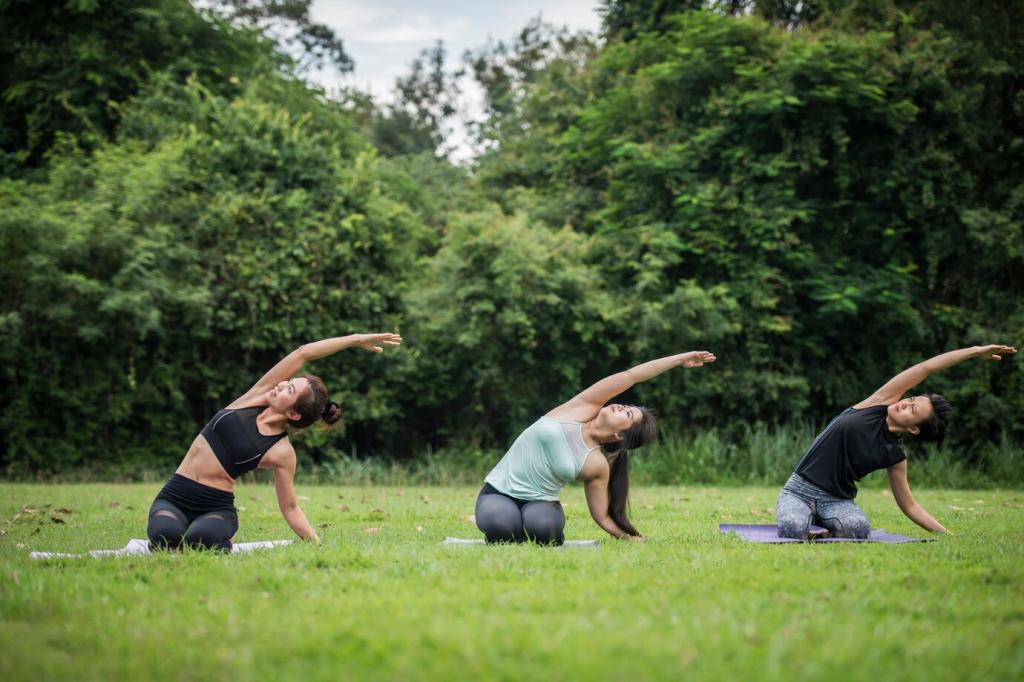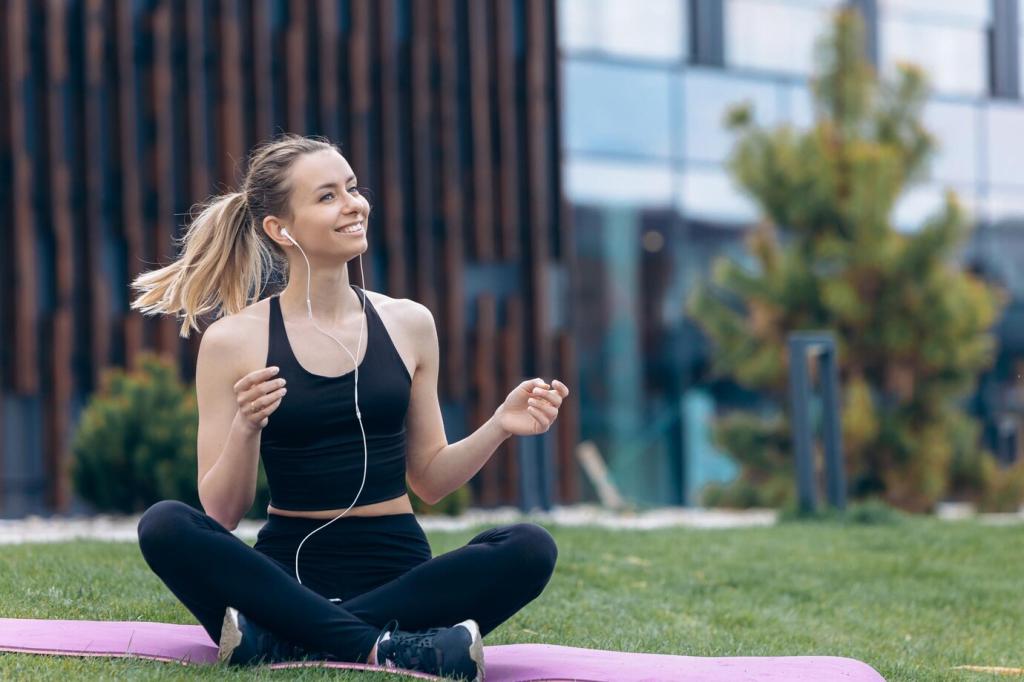
Outdoor Exercise and Mental Health Boost
Engaging in outdoor exercise offers an invigorating combination of physical movement and natural stimulation, creating an environment that deeply benefits mental health. From the calming effects of fresh air to the motivational power of sunlight, outdoor activities uniquely support emotional well-being and cognitive function. Stepping outside for your fitness routine not only fosters a deeper connection with nature, but also helps combat stress, elevate moods, and strengthen social bonds. This page delves into the many ways outdoor exercise can serve as a powerful catalyst for mental wellness, offering insights into why taking your workout beyond the gym can have lasting psychological advantages.
The Power of Nature for Mental Clarity
Sensory Renewal in Green Spaces
Outdoor settings provide a feast for the senses, from the gentle sound of rustling leaves to the invigorating scent of fresh grass. These sensory inputs help distract from ruminative thoughts, encouraging a focus on the present moment. During exercise, this effect is magnified; natural surroundings can act as a soothing backdrop, reducing cognitive overload and inviting relaxation. The vibrant palette of colors, shifting sunlight, and calming vistas collectively encourage a meditative state, making each outdoor activity not just a workout, but a deeply restorative break for the mind.
Reducing Rumination Through Movement
Rumination—the repetitive focus on negative thoughts—is a common contributor to anxiety and depression. Outdoor exercise interrupts these cycles by redirecting attention to physical sensations and the environment. The rhythmic motion of walking or running, combined with the dynamic scenery, diverts the mind from internal worries toward external engagement. This process helps reduce the grip of distressing thoughts and enhances problem-solving abilities, often sparking creative ideas as the mind relaxes into the flow of movement and the unpredictable beauty of nature.
Natural Environments and Mental Refreshment
The restorative effects of natural environments extend beyond mere aesthetics. Scientific studies have shown that even brief exposure to nature can lower cortisol levels—the body’s main stress hormone—and improve cognitive functioning. When exercise is incorporated, these benefits multiply, creating a potent antidote to the mental monotony of urban life or indoor routines. Exercising in nature encourages a break from screens and artificial lights, grounding individuals in the earthy rhythms that humans have evolved alongside for millennia, leading to a profound sense of mental refreshment.
Stress Reduction in the Great Outdoors
Lowering Cortisol With Open-Air Exercise
Cortisol, a hormone intricately linked with the body’s stress response, can cause numerous negative health outcomes if chronically elevated. Outdoor exercise has consistently been found to lower cortisol levels, helping individuals recover more quickly from stressful events. The combination of movement, breath, and exposure to naturally calming stimuli facilitates a gentle recalibration of the body’s stress mechanisms, enabling a return to homeostasis and an improved emotional baseline.
Breathing Room for Mind and Body
Many people underestimate the power of fresh air during physical activity. Outdoor environments often offer improved air quality compared to enclosed spaces, allowing for deeper, more efficient breathing. This influx of oxygen not only enhances physical performance but also has a direct calming effect on the body’s nervous system. Conscious breathing during exercise in open air can interrupt the stress response, replacing shallow, anxious breaths with slower, more satisfying inhalations that send signals of safety and relaxation throughout the mind and body.
Mindful Escapes From the Urban Rush
Outdoor exercise often necessitates leaving behind the relentless pace of urban life, from constant notifications to crowded environments. This act of separation encourages mindfulness—a present-centered awareness that counteracts stress. Activities such as hiking in a quiet park, cycling along scenic paths, or practicing yoga near water promote a state of mental immersion that helps individuals decompress and gain perspective. Integrating mindful escapes into a busy routine provides a vital counterbalance to life’s pressures, leading to improved resilience and overall well-being.

Exposure to sunlight facilitates the body’s production of vitamin D, a crucial nutrient associated with the prevention of mood disorders like depression. Many individuals, especially those living in regions with limited sunlight, experience fluctuations in mood linked to low vitamin D levels. Regular outdoor exercise ensures consistent exposure, supporting biochemical pathways that nourish mental wellness. This form of preventative care is simple yet effective, making every jog, hike, or stretch under the sky a step toward emotional balance.

Exercise naturally stimulates the release of endorphins, the body’s “feel-good” chemicals responsible for reducing pain perception and enhancing feelings of pleasure. When performed outdoors, this effect is further amplified; sunlight exposure stimulates the production of serotonin, another key neurotransmitter involved in mood regulation. The synergy between natural light and physical movement can transform a routine workout into a euphoric experience, sustaining positive feelings long after the activity has ended and reducing overall risk for depressive episodes.

For many, the change of seasons brings a drop in mood known as Seasonal Affective Disorder (SAD), which is closely tied to decreased natural light. Outdoor exercise provides a proactive approach to mitigating the effects of SAD by maximizing sunlight exposure during shorter days. Simple activities like brisk walks during daylight hours or exercising near reflective surfaces such as snow or water can substantially increase light absorption, helping to stabilize mood and energy levels throughout the year. This proactive approach empowers individuals to take control of their mental health regardless of external changes.

Team Activities and Confidence Building
Group-based outdoor activities such as soccer, cycling clubs, or boot camp workouts encourage cooperation and teamwork, reinforcing a sense of accomplishment through shared effort. These experiences can help individuals develop communication skills and build confidence as they encourage one another and work toward collective goals. The sense of being valued and supported within a group is particularly beneficial for those prone to isolation or low self-esteem, paving the way for ongoing emotional growth and increased willingness to engage with others.

Shared Exploration and Adventure
Outdoor exercise often includes an element of exploration, from discovering new hiking trails to navigating waterfront running paths. Experiencing these adventures with others enhances camaraderie and builds lasting memories, which can act as sources of happiness during difficult times. Shared adventures also offer opportunities to support friends or family members, fostering empathy and mutual understanding. This layer of social interaction strengthens mental health by providing communal joy, reassurance, and a dependable network of support.

Reducing Loneliness and Isolation
Loneliness and social isolation are significant risk factors for depression and anxiety. Participating in outdoor group exercise counteracts these challenges by immersing individuals in communal activities. Whether joining a local fitness class in the park or bumping into neighbors during a jog, these incidental interactions create micro-communities that make people feel seen and valued. Regular participation in such activities helps reinforce social bonds, laying the foundation for a robust support system that sustains mental health.
Building Resilience Through Outdoor Challenges
Learning From Physical Obstacles
Navigating hills, uneven paths, or changing weather requires quick thinking and perseverance, turning each workout into a lesson in adaptability. Every hurdle encountered—and overcome—strengthens the neural pathways associated with resilience and determination. These successes, no matter how small, reinforce self-efficacy, shifting mindsets from doubt to capability. The practical experience of overcoming adversity in nature transfers readily to daily life challenges, fostering a positive attitude towards setbacks.
Psychological Growth Through Achievement
The sense of achievement that comes from reaching a mountain summit or completing a challenging trail run is profound. These milestones serve as tangible reminders of one’s abilities, boosting self-esteem and encouraging a growth mindset. The journey to these achievements involves setting goals, overcoming doubts, and celebrating progress—each of which is vital for healthy psychological development. Challenging outdoor exercise thus becomes a practice ground for building the mental fortitude required to thrive in the face of adversity.
Embracing the Unpredictable
Nature is inherently unpredictable, requiring individuals to surrender some control and accept uncertainty. This experience can be transformative, helping to reduce anxiety linked to perfectionism or a need for control. When weather patterns abruptly change or a favorite path is blocked, the body and mind must adapt, fostering flexibility and resilience. Embracing unpredictability during outdoor exercise not only keeps workouts interesting but also cultivates a mindset ready to handle the variable demands of everyday life.
Enhanced Creativity and Cognitive Function
Natural settings have a remarkable ability to spur creative ideas and divergent thinking. The diversity of shapes, sounds, and colors in outdoor environments challenges the mind to make new connections and approach problems from different perspectives. Exercise further facilitates this process, as physical activity increases blood flow to the brain, supporting the development of innovative solutions. Many creative professionals attribute breakthroughs to inspiration found during outdoor walks or runs, reinforcing the idea that nature is a wellspring for the imagination.
Sleep Improvement and Emotional Regulation
Sunlight is a primary regulator of the body’s internal clock. Exercising outdoors, particularly in the morning, helps synchronize the circadian rhythm, resulting in more consistent sleep onset and wake times. This regularity supports hormone production and energy levels, which directly impact mood and cognitive function. By aligning daily activity with natural light cycles, individuals are able to establish reliable routines that improve overall mental and physical health.

Previous slide
Next slide

